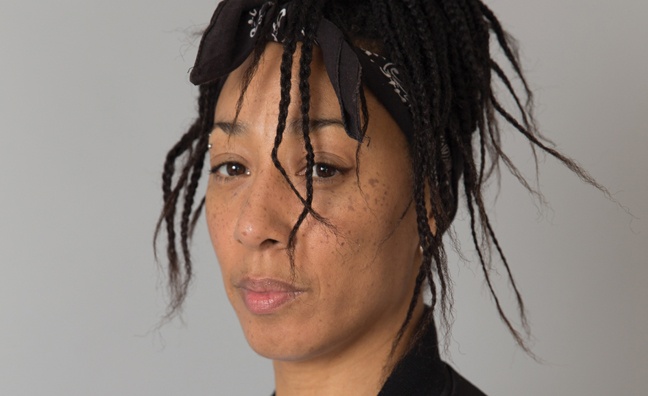Eve Horne, MPG executive director and founder of PeakMusic UK, will be in conversation with Keychange’s Saskhia Menendez on September 19 at the FastForward conference in London.
Eve Horne was an inductee in Music Week's Women in Music Roll of Honour in 2022.
Here, Horne addresses inequality in behind-the-scenes technical roles in the music business, and what we can collectively do to improve accessibility, training and career progression for women and gender-expansive individuals…
The music industry has long been criticised for its lack of diversity and representation. While it has made progress in recent years towards inclusivity in areas such as gender and race, there remains a significant gender gap in behind-the-scenes technical roles. Women and gender-expansive individuals are significantly underrepresented in these roles, which include sound engineering, production and studio work. I’m not alone in thinking this; earlier this year, the US musician and producer Maggie Rogers said: “We simply have to do better for women and non-binary creators in the industry."
Rogers was responding to Fix The Mix, a report examining gender representation in technical roles with the aim of encouraging more women and gender expansive engineers and producers in the industry. The study referenced the 2021 report by the USC Annenberg Inclusion Initiative, which highlighted only 2% of producers and 3% of engineers across the 800 top-charting songs from 2012 to 2019 were women. In addition, only 12.5% of songwriters were women. This is despite the fact that women make up nearly half of all music listeners and consumers.
Musician Brandi Carlile made her views clear on the numbers, saying “We’ve got such a long way to go to reach parity in the studio, but I know we can get there. This is a systemic problem in the recording industry that we cannot ignore any longer.”
So why does it matter so much?
From my perspective, the lack of diversity in technical roles has a significant impact on the music industry. First and foremost, it limits our industry's potential for innovation and creativity. When only a small group of people are responsible for creating and producing music, there is a risk of stagnation and homogeneity. The music industry's lack of diversity also contributes to the perpetuation of harmful stereotypes and reinforces systemic biases. This is why I am so passionate about diversifying our MPG membership.
Furthermore, the lack of diversity in technical roles affects the industry's bottom line. With women and gender-expansive individuals making up a significant portion of music consumers, it makes good business sense to have representation in technical roles. Without diversity in decision-making positions, the industry risks alienating a large portion of its customer base.
Without diversity in decision-making positions, the industry risks alienating a large portion of its customer base
Eve Horne
Moving forward, increasing diversity in technical roles must be a priority; it requires a multi-faceted approach. First and foremost, we, as an industry, need to address the systemic biases that exist, recognise intersectionality, and create a more inclusive culture. This includes providing training opportunities for women and gender-expansive individuals interested in technical roles and actively recruiting and promoting diverse candidates.
Secondly, we need to work together to address the pipeline problem. Women and gender expansive individuals need access to opportunities in music education and mentorship to help prepare them for technical roles. Music production training can be expensive and difficult to access, particularly for those who do not have access to resources or live in rural areas.
Finally, the music industry can be competitive and isolating, and it can be difficult for women and gender-expansive individuals to find a supportive community. We need to work together to cultivate a safe and welcoming space for all.
This is why I launched The Unheard Academy (UA). I want to teach individuals myself and help increase the percentage of women and gender expansive producers in the industry. The UA is a service delivered by diverse female identifying trainers who are People of Colour (POC) and part of the LGBTQIA+ community; together, we provide accessible and inclusive music production training to women and gender expansive producers and artists.
With 40% non-binary individuals, 40% people of colour, 30% mothers, and 10% people with physical disabilities having taken part in the programme already, I believe it is making a positive impact by providing opportunities to groups that are often underrepresented. Additionally, the fact that 50% of the participants have never used Ableton before suggests that the Academy is making music production education more accessible to individuals who may not have had the opportunity to learn these skills previously.
By providing the skills and knowledge necessary to produce and release music, we empower participants to take their creative output to the next level and pursue their education goals and career ambitions in the music industry.
The music industry's lack of diversity in technical roles is a significant issue that has far-reaching implications. The industry must prioritise diversity and inclusion efforts to create a more equitable and inclusive workplace. By increasing representation in technical roles, the industry will not only benefit from increased innovation and creativity, but it will also better serve its ever-growing and ever-diversifying global consumer base
I’ll be speaking about this and more at the FastForward conference on September 19 in London. I hope others will join me to progress the conversation and help turn these words into further actions.









